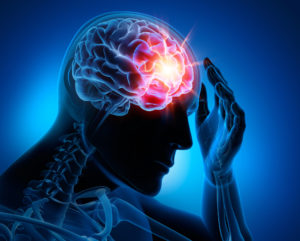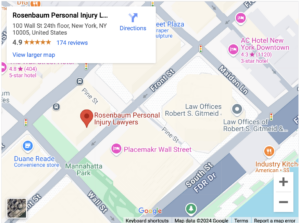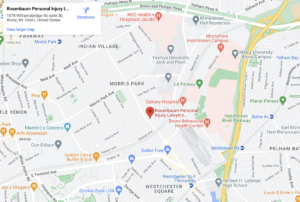Concussion Injury

Doctors rate a concussion as a mild brain injury because they rarely cause death. But if you suffer a concussion injury, you could experience some severe symptoms that do not feel mild to you.
A concussion can result from head trauma. It can also result from an accident that does not injure your head but merely causes your brain to slosh inside your skull.
Because concussions are fairly common after accidents, we’ll cover some of the most important details about a concussion injury and the compensation you can pursue for it.
Table of Contents
How Does a Concussion Injury Happen?
The brain sits inside the skull, where it is surrounded by cerebrospinal fluid (CSF). The skull protects the brain from direct impacts. The CSF cushions your brain inside your skull the same way bubble wrap protects your belongings inside a box.
More importantly, the CSF has a viscosity that is slightly higher than water. This allows the CSF to slow down the movement of your brain. Rather than rattling inside your skull, the brain floats inside the CSF.
Most of the time, this arrangement protects the brain from injury. But when your head experiences rapid acceleration or deceleration, the viscosity of the CSF can damage the brain.
Rapid acceleration or deceleration causes the brain to slosh inside the CSF. When it sloshes, pressure increases in front of the brain and decreases behind the brain. The effect is similar to the wake of a boat moving through the water.
The pressure on your brain can damage brain cells. The body rushes white blood cells, platelets, and other immune cells to the damaged area to begin repairs. Like any injury, the damaged tissue becomes inflamed as part of the healing process.
In this case, the swelling can squeeze the small blood vessels that feed the brain. Inflammation can also cause the brain’s temperature to increase. Inflammation of the brain can cause physical, emotional, and cognitive symptoms.
What Are Common Injuries that Cause Concussions?
Many different types of injuries can result in a concussion, including:
Head Impacts
A blow to the head can cause a concussion. But the blow itself does not necessarily cause the concussion. Your skull and CSF protect the brain from the impact on your head.
Instead, the blow causes your brain to move in your skull. As it moves, it creates a pressure wave in the CSF. This pressure wave causes a concussion.
Acceleration or Deceleration
According to Newton’s Laws of Motion, a body in motion remains in motion until acted on by an outside force. If you suddenly decelerate, your brain wants to keep moving at your original speed. Pressure from the CSF provides the force to stop your brain. This pressure protects your brain from hitting the inside of your skull but causes a concussion.
If you suddenly accelerate, your brain wants to remain stopped. Pressure from the CSF provides the force to move your brain. Again, pressure on the brain damages it.
Blast Waves
An explosion causes a rapid change in pressure. This blast wave radiates out from the explosion. When it hits you, the pressure change can squeeze your brain. This can lead to a concussion.
What Are the Symptoms of a Concussion Injury?
Concussion symptoms can include physical, emotional, and cognitive symptoms. Some of the most common symptoms after a concussion include:
- Headache
- Confusion
- Blurry vision
- Seeing stars
- Tinnitus
- Clumsiness
- Nausea
- Vomiting
- Dizziness
- Drowsiness
These symptoms usually clear up within six to eight weeks after the concussion. If they last longer than two months, a doctor may diagnose you with post-concussion syndrome (PCS).
In PCS, your concussions symptoms will persist and may expand to include additional symptoms. These symptoms might include:
- Irritability
- Emotional outbursts
- Sleep disorders
- Difficulty concentrating
- Memory loss
- Depression
- Anxiety
- Short attention span
Doctors cannot treat PCS. Some research points to a link between PCS and post-traumatic stress disorder (PTSD). Treatment for PTSD may be able to relieve some of the symptoms of PCS.
How Do Doctors Rate the Severity of a Concussion Injury?
Doctors have several scales for rating a concussion injury. The most common is the Glasgow Coma Scale (GCS). If you watch sports, you have probably seen a version of the GCS in action.
The GCS uses three measures in combination to rate a concussion:
Eye Response
If you open your eyes spontaneously, your concussion was mild. If you open your eyes in response to stimulus, like someone talking to you or shaking you, your concussion was moderate. If you lose consciousness or only open your eyes in response to pain, you suffer a severe concussion.
Verbal Response
If you can respond to questions with coherent or mildly confused answers, you suffered a mild concussion. A moderate concussion will produce incoherent answers. If you suffer a severe concussion, you will not respond or respond with sounds rather than words.
Motor Response
After a mild concussion, you can move your body voluntarily. After a moderate concussion, you might have difficulty flexing or extending your arms or body. After a severe concussion, you might not move at all without assistance.
What Are the Risk Factors for a Concussion Injury?
Some accidents have an increased risk of a concussion injury. These accident categories include:
Car Accidents
The rapid deceleration in a car accident can cause a concussion. You can also sustain a concussion if you hit your head on the steering wheel, airbag, dashboard, or side window.
Workplace Accidents
Workplace accidents can cause concussions in many ways. Objects can fall on you. Vehicles can hit you. You hit your head when you fall from a height or slip and fall. A blast at a construction site could change the surrounding air pressure. Any time you have an impact to your head, you’re at a higher risk for a concussion.
What Compensation Can I Recover for a Concussion Injury?
For a mild concussion, you might recover from your injury over a couple of months. But for a severe concussion, you might feel the effects for years.
While you recover, you can get compensation for your medical treatment, including medication. You can also recover compensation for the income you lost due to missed work.
You can seek compensation for all of the ways your concussion injury diminished your quality of life. Pain, mental anguish, lost sleep, depression, and anxiety can support a claim for non-economic damages.
Contact a New York City Personal Injury Lawyer for Help
To learn about the compensation you can seek for your concussion injury, contact Rosenbaum Personal Injury Lawyers for a free consultation. Our New York City personal injury lawyers are standing by.



